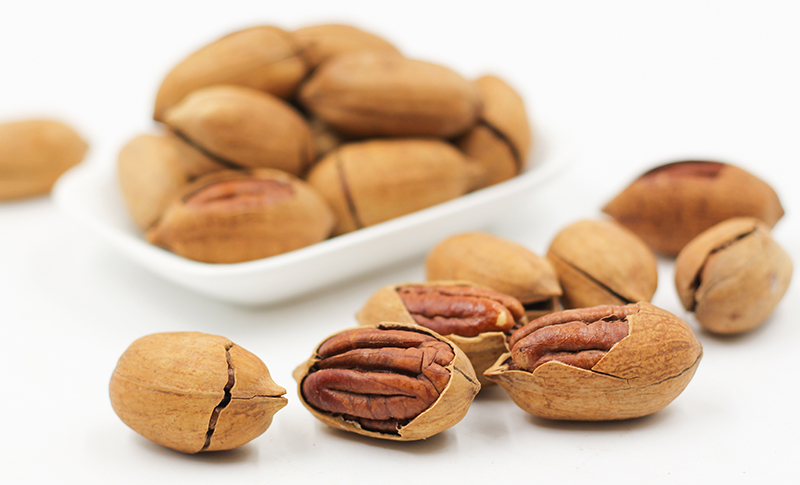Pecans

Survey
If you used these facts, along with the "Fruits, Nuts, and Veggies, Oh My" booklet, please let us know by answering a few quick questions. Your class might be featured on the website as a result!
- The first documented evidence of nut consumption occurred around 7,000 BC, during the Stone Age.
- The name "pecan" is an Algonquin word meaning "a tough nut to crack."
- The history of pecans can be traced back to the 16th Century, originating in central and eastern north America and the river valleys of Mexico.
- George Washington and Thomas Jefferson planted pecan trees in the 1700s. Washington called them "Mississippi nuts."
- Roasted pecan shells were a common coffee substitute in Civil War rations.
- Today pecans are widely available throughout Oklahoma and Texas.
- Pecan trees range in height from 70 to 100 feet but sometimes grow to 150 feet or more. Native pecan trees - those over 150 years old - have trunks more than 3 feet in diameter.
- The pecan tree is a member of the hickory family.
- There are over 1,000 varieties of pecans, many named for Native American Indian tribes.
- Astronauts took pecans to the moon in two Apollo space missions.
- Pecans contain more than 19 vitamins and minerals, including Vitamin A, Vitamin E, folic acid, calcium, magnesium, phospherous, several B vitamins, potassium and zinc.
- Pecans contain compounds with antioxidant properties and can help fight the buildup of LDL cholesterol - low-density lipoprotein - the so-called bad cholesterol.
- Pecans are heart-healthy, containing 87 percent unsaturated fatty acids - 62 percent monounsaturated and 25 percent polyunsaturated.
- Pecans come in a variety of sizes - mammoth, extra large, large, medium, small and midget. They are sold as whole nuts, halves, pieces, granules or meal.
- Although the pecan is a heavy nut, it takes 5,640 halves to equal the weight of a standard watermelon.
- Pecan trees are prized for their lumber, which makes beautiful furniture, flooring and paneling. Pecan wood is also used in agricultural implements, baseball bats, hammer handles, furniture, wall paneling, flooring, religious carvings, and firewood.
- All along the Red River and a line from Ardmore to Tulsa is Oklahoma's major pecan-producing region.
- Okmulgee owns the world record for largest pecan pie, pecan cookie, pecan brownie, and biggest ice cream and cookie party. Each June, Okmulgee rolls out the welcome mat to thousands of its closest friends as the annual Pecan Festival comes to town.
